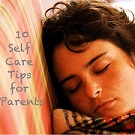The Spectrum Parents group is made up of local parents of children on the Autism Spectrum. The group is "closed" or private, which means you'll need to request an invite from the group moderator, Suzi Noyes. I know many parents who are able to build supportive relationships with others, even though everyone is so busy with life. You'll find links to resources, websites, blogs, events calendars, and, most importantly, other parents to connect with.
One of the group's goals is to remain positive and helpful, which means that you can turn to other parents, without the fear of being judged. If you're a parent in Virginia Beach or Hampton Roads with a child on the spectrum, I'd really encourage you to check out the Spectrum Parents group.
 Photo Credit: mdany via Flickr. Photo Credit: mdany via Flickr.Creative Commons Attribution License 3.0
When do I possibly have time for a nap? It's about how to find the time. I often discuss the importance of self-care with parents of clients on the Spectrum. Self-care is incredibly important in any situation that is demanding, stressful, and time-consuming. Research conducted in 2009 at University of Wisconsin-Madison indicates that mother's of children with autism have stress levels comparable to combat veterans.
How individuals families go about managing time for self-care will depend on their circumstances. We don't expect all of these suggestions to work all of the time, for everyone in every situation, but hopefully they can help you brainstorm creative ways to take good care of yourself, so that you can continue taking good care of others. Please comment and let us know what has worked for you and your family. 1. Be willing to accept help It can be difficult to accept help, when it is offered and even more difficult to ask for help. Oftentimes people around us don't even know that we need or want their help. Sometimes this means delegating within your family, but often they are just as worn out. So, be willing to let those outside of your home know that you need, want, and are willing to accept help. Friends, neighbors, coworkers, and church family are all good places to seek help. 2. Keep a list of what others can do to help (And then LET THEM help, see number 1). I frequently recommend that parents keep a list of chores that can be done, and instructions if necessary. This way family members or friends can do simple chores, such as loading and starting the dishwasher or sweeping the kitchen floor and you can check something off your list. As I said before, people are often willing to help, but they don't always know what to do. 3. Use this time to recuperate, not to get more work done When we do have help, it can be tempting to use the spare time to get more done. Unfortunately, that is not restful or recuperative. This is time to do something fun, relaxing, and enjoyable. It can be time alone reading, taking a walk, (or maybe you just need time to go to the bathroom by yourself!). This same principle can apply to those times when you have your child or family member occupied, maybe with a game or napping, or (gasp!) the television. Be careful to use some of those opportunities for yourself. 4. Utilize every possible (safe) respite opportunity Many of the parents we see, have safety and availability concerns regarding having someone watch their child or loved one. These are valid concerns, it is very important to make sure any babysitter, volunteer, caregiver, attendant, or church nursery worker, is prepared to manage any situations which might arise while caring for a person with special needs. It takes time for parents and family members to trust others with their loved one. Once you've taken the time to get to know the people who will be caring for your child, you'll enjoy your break a whole lot more. In Virginia Beach, there are groups such as Autism Buddies, who provide a few hours of respite care a month. Trinity Presbyterian in Norfolk hosts a respite night for children on the Spectrum and their siblings, ages 3-16, to allow parents time to a few hours off. 5. Get involved in a community Your local church or synagogue can be a great way to build a better support network for both you and your family. Finding a church that fits your special needs can be a challenge. We hear from so many families that just getting everyone to a service is difficult. There are many faith communities in Hampton Roads that want to serve you and your family. More and more churches are looking to include everyone, regardless of ability. You can find a list of faith communities who serve individuals with disabilities and their families at the Faith Inclusion Network (FIN) website. If church is not the right fit for your family, get involved somewhere, such as a mother's group, like MOPs (Mothers of Preschoolers is open to any parent of a school age child), or a local playgroup. 6. Take your family to sensory-friendly events This is really about finding balance between routine and fun. When your family is able to spend time in the community doing "normal" things, it can help everyone feel more "normal". For example, AMC Lynnhaven in Virginia Beach has at least one sensory friendly movie showing each month. This is usually a Saturday morning matinee and is always popular. The volume is turned down, the lights are kept on, and the previews are shortened or eliminated. This crowd knows and understands disability, so no one is going to get unnerved if your child has a meltdown or flaps his hands. 7. Consider using a tracking device It can be much easier to utilize respite or babysitting opportunities to relax, if you are not concerned about your child's safety if they were to wander off. Of course, make sure you choose responsible individuals to begin with, but things happen. Project Lifesaver provides a tracking service for a very low monthly fee and is able to locate individuals within 30 minutes, if they are contacted right away. The initiative has been life-changing for many of our clients. 8. Encourage independent playtime Work with your child or loved one to have a semi-structured period of independent time each day. It can be easier to start with short periods of time, such as 10 minutes, and work up to 30-45 minutes. It is helpful if this can be at the same time each day and in the same room. Give her one or two activities and explain that she can play by herself for X number of minutes and to come get you if there is an emergency. Make sure that you use this time to relax and rest yourself. 9. Consider Support Groups Many people have heard of attending support groups, but this sounds too much like "therapy". Tidewater Autism Society of America lists many informal events each month on it's meetup.com group. One event that many parents in our office like is the Coffee & Chat meetup. It's informal and supportive. 10. Address your own issues regarding the disability Disability is not something we expect or hope for when we have children. Parents find it difficult to find time and energy to work through the feelings of grief and loss that naturally arise in these types of situations. Once you are able to work through some of these things, you will find yourself more emotionally and physically able to manage the situation at home and provide the best possible care to your child.
|
Nikki Schwartz,
|







 RSS Feed
RSS Feed
